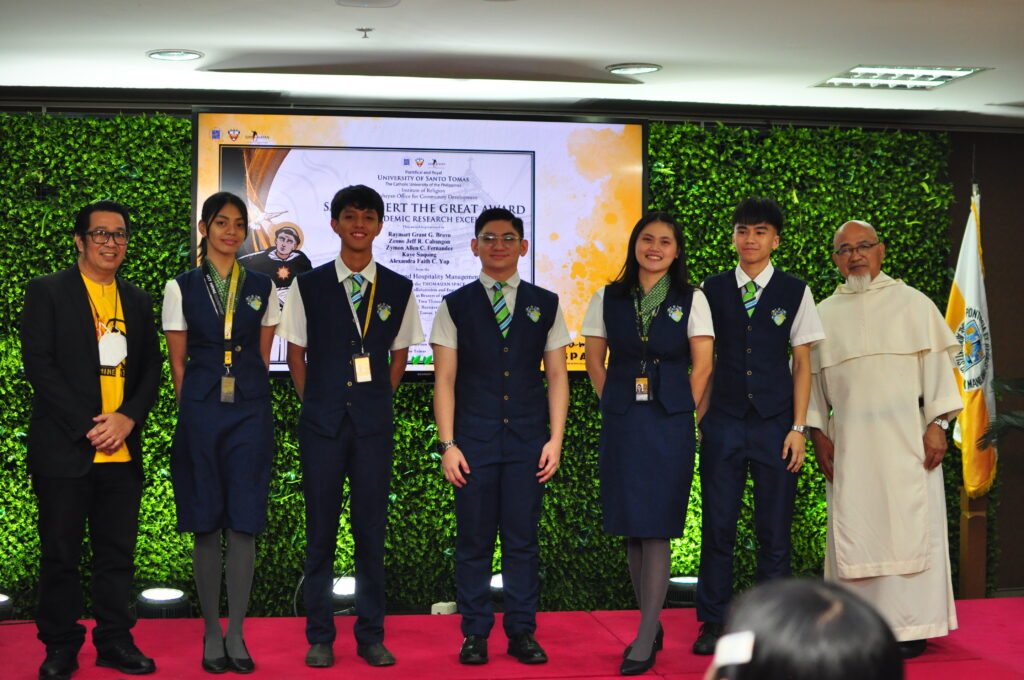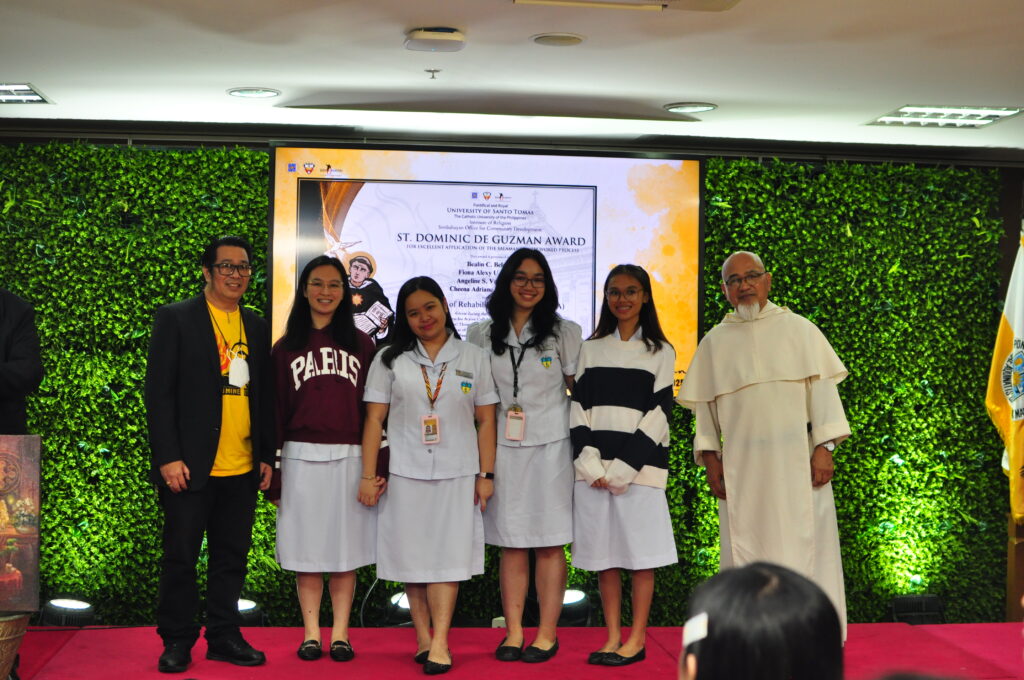The University of Santo Tomas – Institute of Religion, spearheaded by the Committee for the Religious and Academic Formation of Thomasians (CRAFT), in collaboration with the Simbahayan Community Development Office and the Center for Theology, Religious Studies, and Ethics, successfully held the Thomasian Salamanca Process for Active Collaboration and Engagement (SPACE) 2025 last March 21, 2025, at the George S.K. Ty Function Hall of the Bl. Buenaventura Garcia Paredes, O.P. Building. With the theme, “Tanglaw: Thomasians as Bearers of the Light,” this year’s event reinforced the Dominican commitment to integrating faith, intellectual inquiry, and community engagement.


Thomasian SPACE serves as the culminating event for theology courses, emphasizing the holistic approach of study, research, analysis, and action in faith-based learning. This year’s program was structured to reflect these core pillars.
The welcome remarks and rationale provided an overview of Thomasian SPACE’s objectives. Participants then engaged in a tableau presentation titled “Kalagayan ng mga Kabataan” and a roundtable discussion, which explored the realities faced by today’s Filipino youth, including issues such as economic hardships, mental health struggles, and political participation. The session concluded with an insightful analysis led by Rev. Fr. Nicanor Pier Giorgio Austriaco, O.P., PhD, S.Th.D., who highlighted how Thomasians can harness biogenetics to help underprivileged communities.
Roundtable discussants reflected on the metaphor of liwanag (light) and dilim (darkness) in their personal and academic journeys. Many identified sources of liwanag as family, mentors, and faith, while acknowledging dilim in the form of academic burnout, financial instability, and social injustices. The discussions also delved into how Thomasians could become a tanglaw (guiding light) for others—through their professions, advocacy work, and personal growth. On the other hand, Fr. Austriaco’s keynote address explored how science and faith intersect in addressing societal needs. His research on yeast-based vaccines and astrobiology’s potential applications in the Philippines underscored the country’s scientific promise—contingent on government support. He also provided a critical perspective on contemporary moral issues, including gender identity, divorce, and abortion, sparking further discussions among participants.
The afternoon session showcased Course Inquiry Project (CIP) presentations through parallel sessions, followed by plenary discussions. The event concluded with an awarding ceremony and a Eucharistic celebration, reinforcing the spiritual foundation of the Thomasian community.
The event recognized outstanding student works through various awards named after Catholic saints. Among the awardees were: the Fra Angelico Award for Best Visual Art was awarded to Rolando B. Castro (College of Fine Arts and Design); the Saint Francis of Assisi Award for Best Literary Creative Work was awarded to “Humanity!” by Iana Marie Clare D. Amante, Cyra Joy D. Dano, Gabriel R. De Leon, Jeremiah Jyrel L. Finuliar, Raymond James C. Gaas, and Beatrice G. Remalante (College of Commerce and Business Administration); the Saint Cecilia Award for Best Song Composition was awarded to “Beyond the Light: A Call to Discipleship” by Iza Nicole S. Barcena and Enzo Sebastien T. Luzande (AMV-College of Accountancy); the Saint Martin de Porres Award for Best Research Poster was awarded to “From the Podium to the Senate: Faith, Ethics, and the Impeachment Debate” by Deanne Gwyneth Perez, Glexie Antoinette Sagay, Kaleah Dominique Sy, Alexandra Turado, Catherine Ysabel Veloso, and Sheree Khate Zambrano (AMV-College of Accountancy); the Saint Carlo Acutis Award for Best Catechetical Video awarded to “Commandment #6: Thou Shalt Not Kill, A Catechetical Scrutiny of the Immortality of Extrajudicial Killings” by Maria Nicole Tabaquero, Franz Rickhayle Salangsang, Muneerah Jill Gagarin, Stefi Louise Genio, Allia Faye Bergano, and Raphael Rayree Custodio (Faculty of Arts and Letters); and the Saint Albert the Great Award for Best Academic Research Paper awarded to “The Silent Struggle: Influence of Middlemen on the Profits of Filipino Rice Farmers” by Raymart Grant G. Bravo, Zenno Jeff R. Cabangon, Zymon Allen C. Fernandez, Kaye Saquing, and Alexandra Faith C. Yap (College of Tourism and Hospitality Management).
The major awards honored students who demonstrated a profound application of Dominican and Thomistic principles, namely: the Saint Thomas Aquinas Award for Best Integration of Thomistic Principles was awarded to “Might Grant: Lived Experiences of Migrant Workers” by Urielle V. Briones, Trisha Mari M. Casas, Princess Cariel N. De Asis, Adriana Dominique S. Estolas, and Bettina Nicole P. Gutierrez (College of Tourism and Hospitality Management); the Bartolomé de las Casas Award for Best Community Service Proposal was awarded to “Faith and Health: Bridging Church Teachings with Family Planning and Sexual Education in the Philippines” by Mary Denise B. Bote, Lady Nikka N. Dela Cruz, Siqueem L. Quilino, John Ronn Carlo C. Roldan, Graciela C. Tolentino, and Nicole Beatrice M. Vargas (College of Commerce and Business Administration); the Saint Mary Magdalene Award for Best Expression of GCE, SDG, and PDP Commitments was given to “Analyzing the Ethicality of Human Experimentation in the Eyes of the Catholic Church” by Harvey Michael S. Agustin Jr., Reynald J. Banzon, Dana Therese Y. Bautista, Kyle Michael E. Gimenez, Isabelle Amanda S. Rivera, and John Carlo I. Santos (College of Nursing); and the Saint Dominic de Guzman Award for Best Application of the Salamanca New World Process was awarded to “The Struggle for Change: Jails in the Philippines as Centers for Rehabilitation or Sites of Punishment?” by Bealin C. Beley, Fiona Alexy U. Perez, Angeline S. Valderama, and Cheena Adriane Lei T. Viado (College of Rehabilitation Sciences).
Thomasian SPACE 2025 reaffirmed the University’s commitment to fostering a holistic and faith-driven education. By engaging in deep theological reflection and community-oriented initiatives, Thomasians continue to be bearers of light, embodying the Dominican motto “contemplari et contemplata aliis tradere”—to contemplate and share the fruits of contemplation.
As the event concluded, the words of St. Thomas Aquinas echoed: “It is better to illuminate than merely to shine.” This serves as a reminder that knowledge, when shared and applied for the greater good, becomes a true beacon of light in today’s world.


